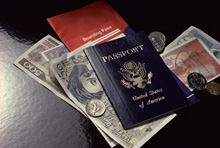Will New RFID Chips Threaten Your Right to Privacy?
by www.SixWise.com
As of June 1, any American entering the United States coming from Canada, Mexico, Bermuda and the Caribbean are required to show identity cards embedded with RFID tags. Conventional passports will continue to be valid until their expiration date. As a result of this new rule, concerns are growing over privacy issues surrounding the use of RFID (Radio Frequency Identification) and the ability to access other’s information without their consent.

Washington, Vermont, Michigan and New York have already begun issuing “enhanced driver’s licenses” embedded with RFID tags. |
A Study Reveals How Easy it is to Hack Into RFID Cards
Researcher Chris Paget decided to conduct his own experiment on how easy it was to track RFID cards. Armed with a Matrics antenna and a Motorola reader he picked up on eBay for $190, Paget set out on a mission to read the identity cards of strangers without them knowing it.
Conducting his study all from the comforts of his Volvo, within a half hour Paget was able to detect and then download the personalized serial numbers from the electronic U.S. Passport cards embedded with RFID tags from two pedestrians. An hour later he was able to pull the identity of four more microchipped PASS cards.
What the Opponents are Saying
Neville Pattinson, vice president for government affairs at Gemalto, Inc., a major supplier of microchipped cards said that RFID cards have one fundamental flaw: Each chip is built to faithfully transmit its unique identifier “in the clear, exposing the tag number to interception during the wireless communication.”
Critics said that attaching a traceable RFID on each individual will eventually give the government the ability to track everyone’s day-to-day actions in real-time, creating an Orwellian government.
They also stated the RFID tags will give the green light to thieves and stalkers (with this access) to commit crimes against victims who immediately won’t even realize a crime was committed.
What are RFID Cards and How are They Used?
RFID cards are miniscule microchips that respond to a radio query by transmitting their unique code. The implanted tag in the cards contains a miniature antenna and chip containing a 16-digit identification number that is scanned by an RFID reader. Once it’s verified, the number is used to unlock a database file. Some of the readers have the ability to identify tags up to 30 feet away.
Sightings of RFID tags are increasing and can be found everywhere including groceries and clothing, in library cards, car keys, highway toll tags, bank cards, warehouse inventories, skin-tags for pets, parole tags for prisoners, hospital patient wristbands, stock inventory, logistics and security finance.
Government Support of RFID Cards
Government officials argue that the RFID tags are for the protection of homeland security and will help speed up the border crossing process, provide a foolproof method against counterfeiters and prevent terrorists from sneaking past the borders.
According to Mary Ellen Callahan, the chief privacy officer at Homeland Security, “The change is largely about speed and convenience. An RFID document that doubles as a U.S. travel credential “only makes it easier to pull the right record fast enough, to make sure the border flows, and is operational” -- even though a 2005 Government Accountability Office report found that government RFID readers often failed to detect traveler’s tags.

The most controversial use of RFIDs is whether or not they should be implanted into people -- which would potentially allow you to be monitored 24/7. |
RFID Chips are Already Being Implanted Into People …
At least 2,000 people around the world have been implanted with RFID devices manufactured by VeriChip Corporation.
The microchips are being touted as a medical innovation that could transmit important medical information in people with Alzheimer's disease and other conditions that make identification difficult. A scan of the patient's arm would reveal the person's entire medical history almost instantly.
Already the chips have branched off into non-medical uses, however -- staff members of the Mexican Attorney General's office have been implanted with the VeriChip to control access to a data room, for instance, and two nightclubs overseas use an implantable VeriChip to identify VIP customers and allow them to buy drinks.
However, VeriChip is working on expanding the chip's medical market to a target audience of 45 million Americans, particularly those with Alzheimer's disease, heart conditions and diabetes.
Already, they've invested millions in assembling a national network of hospitals that are equipped to scan patients with microchips.
Aside from the potential privacy concerns, the human microchips have raised concerns because of a potential link to cancer.
Types of RFID Cards Growing in the Travel Sector
Enhanced Driver’s License (EDLs)
EDLs embedded with RFID tags are currently being issued in the following border states: Washington, Vermont, Michigan and New York. Recommendations issued from the U.S. Department of Homeland Security briefings have expanded the license reach to include non-border states such as Kansas and Florida.
Approximately 192,000 EDL’s have been issued in Washington, Vermont, Michigan and New York.
U.S. Passport Card
The production of the U.S. Passport card (also called a PASS card) began on July 14, 2008 and to date over 1 million cards have been issued. The card is wallet-size and can be used to re-enter the United States from Canada, Mexico, the Caribbean and Bermuda.
The passport card contains an electronic chip that allows customs and border protection inspectors to access photographs and other biographical information kept in secure government databases before the traveler makes it to the inspection station.
Information on the Electronic Passport Chip
The electronic chip doesn’t contain any personal information or any personally identifying information. The information on the chip includes:
-
The same information visually displayed on the data page of the passport
-
A biometric identifier in the form of a digital image of the passport photograph. This allows the use of face recognition technology at ports-of-entry
-
The unique number that points to a stored record contained in a secure government database
-
A digital signature to protect the stored data from alteration
Privacy Protection
For the protection of RFID users, the passport card has a protective RFID-blocking sleeve to guard against unauthorized reading or tracking of the card when it’s not in use. Additionally, the department has taken other preventative measures to prevent hackers and others from accessing the RFID holder’s information. These measures protect against the following illegal practices:
-
Eavesdropping: Interception of information as it travels from the chip to the chip reader. To counter eavesdropping activity, the department implemented Basic Access Control (BAC) that works by storing a pair of secret cryptographic keys in the passport chip that requires the initial transmittal between the embedded chip and the border control personnel to include protocols for setting up the secure communication channel.
-
Cloning: Substituting the chip of an e-passport with a fake chip that contains the data copied from the chip of another e-passport. Cloning is mitigated by comparing the data stored on the chip to the data on the e-passports data page. In the event the photos and biographical data don’t match, the e-passport is refused access.
The potential implications of a microchip that can track an object's movement and location, as well as things like temperature (for food items like milk) and perhaps one day human body functions, medical records, bank account numbers and even how many eggs are left in your refrigerator, are just beginning to be felt.
Some consumer advocates have already dubbed RFIDs "spy chips" and are concerned that "Big Brother" could one day use them for mass surveillance. On the other hand, proponents say RFIDs are information powerhouses that could take automating our lives to a whole new level.
The key, experts say, will be maintaining a balance between privacy and the proper use of information.
Recommended Reading
Proposed National Database Sparks Privacy Controversy
Will Google become "Big Brother"? The Privacy Concerns You Need to Know
Sources
Fox News July 11, 2009
U.S. Department of State U.S. Passport Card
U.S. Department of State U.S. Passport Card FAQs
U.S. Department of State U.S. Electronic Passport FAQs
Credit Cards.com
Science Daily November 25, 2008